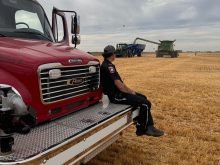Lurking in the muddy water, mould spores or chemicals are serious threats to those without proper protection
Risks from spring flooding don’t end when the water recedes, said a safety expert.
Carolyn Sheridan, clinical director with the AgriSafe Network, said farmers are busy dealing with the immediate crisis during the acute phase of a flood.
“Then it’s afterwards that we have all these other things that hit us,” she said.
That includes both physical and mental challenges.
Mould spores from wet hay or feed can cause long-term lung damage, so appropriate respiratory protection beyond the often-used single strand mask is important.
Read Also

Know what costs are involved in keeping crops in the bin
When you’re looking at full bins and rising calf prices, the human reflex is to hold on and hope for more. That’s not a plan. It’s a bet. Storage has a price tag.
She recommended the National Institute for Occupational Safety and Health two-strap type, saying it is about the same size and weight as the single strand mask but offers a better seal and more protection.
“A respirator is only as good as its fit,” said Sheridan.
A variety of products and cartridge attachments are available for a host of environments with some filtering out 100 percent of air.
“You do get what you pay for,” she said.
Masks and other personal protective garb such as gloves and coveralls are also advised to protect against zoonotic diseases that are transferred to animals from humans in fungal spores.
Symptoms can mirror the flu and range from fever and coughs to chest and body aches.
“The incidence of zoonotic disease rises rapidly when there’s been a flood,” Sheridan said.
She conceded that the use of personal protective equipment can cause its own set of problems for the wearer, especially when working in the heat or in enclosed spaces.
For more information, click here to visit AgriSafe Network’s website
“You’re often working alone a lot and can be overcome with heat illness and be unable to call for help and be in a serious situation,” said Sheridan. “Long sleeves can be a pretty good substitute.”
In addition, use the buddy system so that someone is working with you or checking in periodically.
Sheridan advised accessing expert resources in your community for guidance and assistance with chemical spills or well water contamination following floods.
Finding resources to assist with the emotional toll of such events is equally important, she said.
Be prepared by knowing what mental health care is available in your community.
Symptoms of poor mental health can include suicidal thoughts, changes in sleep or eating patterns, increased use of drugs or alcohol, withdrawal, aggressive behaviour and irritability.
“Stress can really impact the whole rest of the spectrum,” she said. “We don’t react like we should and just try to get through the moment.… Be prepared ahead of time if at all possible.”















